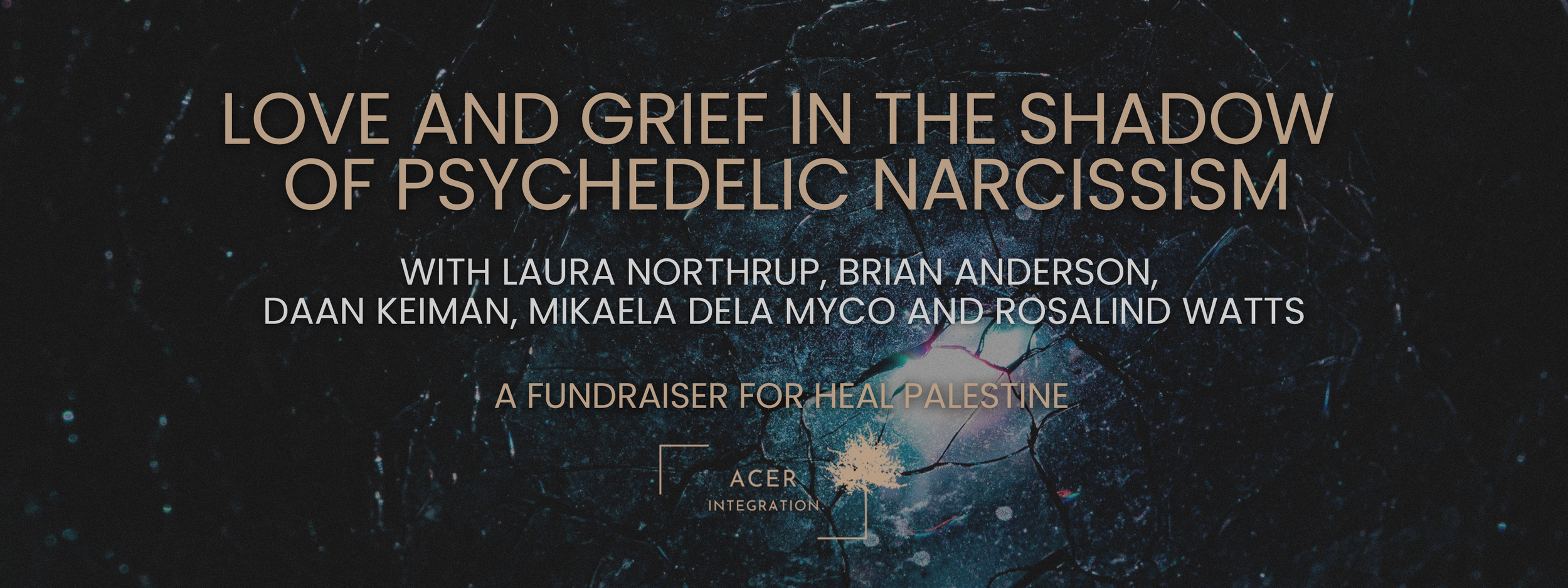Dr Rosalind Watts welcomes Laura Northrup, Brian Anderson, Daan Keiman and Mikaela dela Myco to spark a dialogue on the complexities of psychedelic narcissism, exploring its cultural underpinnings, different manifestations, and pathways to recovery.
WETIKO
We live in a culture that is based on, breeds, and rewards an individualistic, arrogant, and extractive orientation to life. This can be described as ‘Wetiko’, which is an Algonquin word for a ‘mind virus’ that leads to separation, selfishness, and insatiable greed (Paul Levy). We see extreme examples in the political leaders around the world, and at the top of most fields.
Many of us have hoped that psychedelic therapy could help ‘treat’ the Western world’s Wetiko epidemics: and indeed psychedelics can help people feel deeply connected, which is the opposite of Wetiko and perhaps its cure. But when we insert psychedelics into capitalist, materialistic Western culture, with no intact lineage to a tradition of grounded psychedelic use and no social structures to support healthy integration, psychedelics may amplify the problems we hoped they would solve.
The psychedelic field has problems, as all fields, of capitalist market forces driving a winner-takes-all attitude, which stifles collaboration, entrenches power structures that reward and promote extractive tendencies, damages the environment, drives short-termism, and distorts human values.
Wetiko brings separation, competing agendas, conflicts of interest, avoidance of difficult conversations, and dishonesty. There is also maverick energy, the ‘breaking into new frontier’ confidence which can do harm when it is not kept in check, and balanced with the needs of the collective. For example, in psychedelic research, the prioritizing of ‘data’ over care. The prioritizing of speed (and goldrush territory-claiming) over safety. We are increasingly hearing about massive lapses of judgment, sickening boundary violations, and the tragedies that ensue when therapists and facilitators become infected with Wetiko and see people as objects, there to make them feel good.
Within the context of psychedelics, participants are literally ‘under the influence ’ and in a state of increased vulnerability, where even small lapses in ethics are amplified and can have serious consequences. Survivors may feel shame about why they didn’t see what was happening. Often, before the attacks, they were flourishing with talents, vibrant social networks, and warm hearts: targeted because they had a lot that was worth taking.
This type of exploitation can be ongoing for years and can wreck livelihoods and pollute once-thriving communities of care.
WHAT TO EXPECT
Somatic psychotherapist and author of the book Radical Healership, Laura Northrup will discuss the healing impulse and the ‘shadow why’ (and how it can get inflated)
Psychiatrist Brian Anderson will discuss lessons from a key scientific paper from the 60s which warned of a link between LSD use and narcissism
Psychedelic and Buddhist chaplain, and psychedelic facilitator, Daan Keiman will highlight the common red flags in cases of harm
Psychedelic educator and founder of Tapped Out Coalition Mikaela dela Myco will talk about surviving severe psychedelic narcissism, and how rematriating medicine work could support the field
We will hear briefly about different community outreach/support projects, including PsyAware, SHINE Collective, Sacred Plant Alliance (Anya Oleksiuk), and Toxic Workplace Survival Guy (Matthew Green)
FUNDRAISING FOR GAZA
All profits will go to Heal Palestine because the genocide in Gaza is an example of the most extreme Wetiko many of us have ever witnessed in our lifetimes, and raising money for anything else feels wrong.

